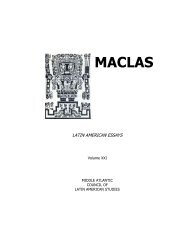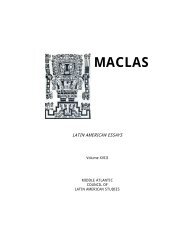latin american essays maclas
latin american essays maclas
latin american essays maclas
Create successful ePaper yourself
Turn your PDF publications into a flip-book with our unique Google optimized e-Paper software.
wide sense of the term. 4 They include Amancio Alcorta y Palacio<br />
(Argentina, 1842-1902); Alejandro Álvarez (Chile, 1868-1960); José<br />
Joaquín Caicedo Castilla (Colombia, 1903-1979); Francisco Cuevas<br />
Cancino (Mexico, 1921-present); Charles G. Fenwick (U.S.A., 1880-<br />
1973); Homero Henríquez (Dominican Republic, flourished 1900s-<br />
1940s); Lucio M. Moreno Quintana (Argentina, 1898-unknown); Carlos<br />
Augusto Sánchez i Sánchez (Dominican Republic, 1895-1974); Antonio<br />
Gómez Robledo (Mexico, 1908-unknown, flourished 1940s-1990s);<br />
César Sepúlveda (Mexico, 1916-1994); Francisco José Urrutia (Colombia,<br />
1870-1950); José María Velasco Ibarra (Ecuador, 1893-1979); Jesús<br />
María Yepes (Colombia, 1891-1962); and, to a lesser degree, Juan<br />
Carlos Puig (Argentina, 1928-1989).<br />
• Second, there are several scholars who believe that the American<br />
republics have developed original legal principles but have not created a<br />
distinct regional system of international law. These scholars include<br />
Juan Bautista Alberdi (Argentina, 1810-1864); Carlos Saavedra Lamas<br />
(Argentina, 1880-1959); Alberto Ulloa y Sotomayor (Peru, 1892-1975);<br />
H.B. Jacobini (U.S.A., 1922-present); and, again, Juan Carlos Puig. 5<br />
• Third, there are those authors who believe that the American republics<br />
have not developed a distinct regional legal system and do not even<br />
have a right to do so. They include Carlos Calvo (Argentina, 1824-<br />
1906); Manoel Alvarado de Souza Sá Vianna (Brazil, 1860-1923); Daniel<br />
Antokoletz (Argentina, 1881-unknown); and Julio Galindo Alarcón (Peru,<br />
1943-present). 6<br />
While it is difficult to determine with certainty who first proposed the<br />
creation of a regional legal system in the Western Hemisphere, the idea can be<br />
traced back to the era of Simón Bolívar. In his 1824 diplomatic note inviting all the<br />
independent countries of the New World to meet in Panama City for the first<br />
Congress of American Republics, Bolívar suggested that one of the main goals of<br />
this gathering should be the establishment of legal principles to regulate relations<br />
among them. Pursuant to this suggestion, the 1826 Congress of Panama discussed<br />
developing a code of regional international law. 7 Although the Treaty of Union<br />
produced by the Panama Congress did not come into effect for lack of sufficient<br />
ratifications, the interest in a regional legal system remained present in the writings<br />
of many legal scholars of the Western Hemisphere.<br />
Less than two decades later, the Argentine scholar Juan Bautista Alberdi<br />
published an article (1920a, 6:24) calling for a “General American Congress,”<br />
which would codify a regional legal system that he termed “American<br />
International Law.” While Alberdi favors the recognition of regional legal<br />
systems, affirming that positive international law is as varied as the number of<br />
states, his position on the existence of American International Law is ambiguous.<br />
In his review of Carlos Calvo’s book El derecho internacional teórico y práctico,<br />
33




